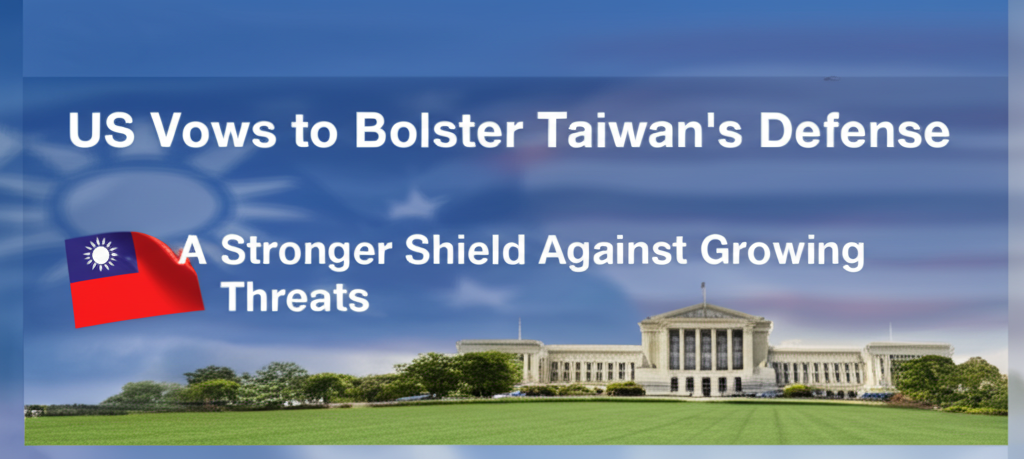US Vows to Bolster Taiwan's Defense: A Stronger Shield Against Growing Threats
Washington Doubles Down on Commitment Amidst Regional Tensions and Economic Concerns

The US Department of Defense is steadfastly committed to fortifying Taiwan's defense capabilities, even as the economic implications of US trade policies are debated, a Pentagon official declared on Wednesday.
The department is actively "working to prioritize our security systems to Taiwan," as stated by US Assistant Secretary of Defense for Indo-Pacific Security Affairs John Noh during a US House of Representatives Armed Services Committee hearing.
While US President Donald Trump's "reciprocal" tariffs have introduced complexities, particularly concerning their potential impact on the global economy, the focus remains on safeguarding Taiwan.
Military vehicles equipped with US-made TOW 2A missiles are pictured during a live fire drill in Pingtung on July 3, 2023. Photo: REUTERS
Despite initial announcements, Trump announced a temporary pause on the tariffs for many nations, except China, highlighting the dynamic nature of trade relations.
The implications for Taiwan's economy were also discussed. US Representative Eric Sorensen questioned, "If we hurt the Taiwanese economy, how can the administration demand that Taiwan spend more on its own defenses?"
Noh emphasized the crucial nature of this support, stating, "Arming Taiwan and strengthening Taiwan’s defense capabilities is extremely important for not only the defense of Taiwan, but for strengthening our posture and re-establishing deterrents."
US President Donald Trump “has stated that China will not attack Taiwan on his watch. Thus, we must, with urgency and focus, prioritize efforts to strengthen deterrence against Chinese aggression in the Indo-Pacific,” he continued in a written statement.
The need for Taiwan to increase its defense budget to 3 percent of GDP was underscored, with an emphasis on the necessity for more significant investment.
Sorensen pledged support for Taipei, affirming Taiwan as both a democracy and a strategic ally.
"While we work to boost our own domestic semiconductor manufacturing capabilities, we must ensure that Taiwan is able to contribute to our supply chains," Sorensen said, stressing the importance of US-Taiwan collaboration in developing new technologies.
"That means that we must also remain steadfast partners in the region as China continues to develop its offensive power," he added. "The future of Taiwan does matter to American interests."
US Indo-Pacific Commander Admiral Samuel Paparo warned that Beijing’s “aggressive” maneuvers around Taiwan “are not just exercises — they are dress rehearsals for forced unification.”
He highlighted China’s "unprecedented military modernization," including advancements in artificial intelligence, hypersonic missiles and space-based capabilities, which pose "a real and serious threat," he wrote.
Paparo reiterated the US’ commitment to assisting Taiwan in building a "credible, resilient, distributed and cost-effective" defense capability, in alignment with the Taiwan Relations Act, the Three Joint Communiques, and the "six assurances."
Last year, the Chinese People’s Liberation Army (PLA) significantly increased military pressure against Taiwan, escalating by 300 percent, Paparo noted.
"While the PLA attempts to intimidate the people of Taiwan and demonstrate coercive capability, these actions backfire, drawing increased global attention and accelerating Taiwan’s own defensive preparations," he observed.
Paparo emphasized the need to expedite the delivery of US weapons to Taiwan by eliminating bureaucratic hurdles, streamlining supply base certifications, and ensuring stable funding.
Furthermore, Paparo has outlined a strategy to transform the Taiwan Strait into an "unmanned hellscape," deploying uncrewed undersea vehicles, surface vehicles, air systems, and loitering munitions.
This approach aims to deny the PLA air and maritime superiority at a low human cost, focusing on deterrence rather than direct confrontation.
Taiwan's investments in autonomous systems align with the US strategy, reinforcing the collective commitment to regional security.
Other Versions
EE.UU. se compromete a reforzar la defensa de Taiwán: Un escudo más fuerte contra las crecientes amenazas
Les États-Unis s'engagent à renforcer la défense de Taïwan : Un bouclier plus solide contre les menaces croissantes
AS Bersumpah untuk Meningkatkan Pertahanan Taiwan: Perisai yang Lebih Kuat Melawan Ancaman yang Terus Meningkat
Gli Stati Uniti promettono di rafforzare la difesa di Taiwan: Uno scudo più forte contro le crescenti minacce
米国、台湾の防衛力強化を宣言:高まる脅威に対するより強固な盾に
미국, 대만 국방 강화 약속: 증가하는 위협에 대한 더 강력한 방어막
Nangangako ang US na Palalakasin ang Depensa ng Taiwan: Isang Mas Matibay na Kalasag Laban sa Lumalaking Panganib
США обещают усилить оборону Тайваня: Более надежный щит против растущих угроз
สหรัฐฯ สัญญาว่าจะเสริมสร้างการป้องกันไต้หวัน: เกราะป้องกันที่แข็งแกร่งขึ้นเพื่อต่อต้านภ
Mỹ Cam Kết Tăng Cường Quốc Phòng Đài Loan: Lá Chắn Vững Chắc Hơn Trước Các Mối Đe Dọa Ngày Càng Tăng

